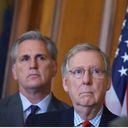Establishment Republicans hide fingerprints with carefully timed primary spending

Deep-pocketed Republican groups are pouring millions into efforts to knock off hard-right GOP primary candidates — while ensuring the source of the cash stays shrouded until after voters select their nominees, Axios has learned.
Why it matters: Through "pop-up" super PACs, frequently branded with local-sounding or vaguely ideological names, Republican operatives in Washington can try to tip the scales of key intra-party fights without leaving any fingerprints.
Driving the news: The latest battleground is New Hampshire, where high-dollar super PACs are running millions in ads boosting more mainstream Republican contenders and attacking their right-wing rivals ahead of Tuesday's primaries.
- White Mountain PAC was formed late last month and has already spent nearly $5 million backing Republican state Sen. Chuck Morse and hitting his hardline U.S. Senate primary opponent, Don Bolduc.
The intrigue: The New York Times reported this month that White Mountain is "linked to" Senate Minority Leader Mitch McConnell's political operation.
- There's no information in the public domain proving those links. And that appears to be by design — its New Hampshire foray was timed so voters won't know who's funding the group until its next financial filing a week after the primary.
- McConnell's Senate Leadership Fund previously bankrolled a super PAC that attacked Republican Senate candidate Eric Greitens in Missouri. It timed that spending to forestall donor disclosure until after the primary, which Greitens lost.
Between the lines: Backing from "establishment" figures in Washington can be a political liability in primary contests in which pro-Trump GOP base voters often turn out in droves.
- By carefully timing an independent expenditure campaign, operatives can drop millions into a hard-fought race before voters have any idea where the money is coming from.
Zoom out: The tactic has played out in races across the country this year, generally to the benefit of more moderate Republican candidates and at the expense of hard-right primary rivals.
- Also in New Hampshire, a group called American Liberty Action PAC has spent about $730,000 boosting Keene Mayor George Hansel's Republican House bid against his pro-Trump opponent Bob Burns.
- The group, which has yet to disclose any donors, also put up huge sums attacking hard-right Republican House candidates Anthony Sabatini in Florida and Carl Paladino in New York, both of whom lost their primary bids last month.
- Another group, the Eighteen Fifty Four Fund, has given millions to pop-up super PACs aimed at taking out hard-right midterm candidates, again timing those donations to be disclosed only after the contests at issue.
- In Wyoming, national Republicans unsuccessfully worked to fend off a Trump-backed challenge to Rep. Liz Cheney in ways that obscured their involvement.
What they're saying: Those sorts of tactics can help keep the focus on candidates and off of the groups themselves, explained veteran Republican strategist Doug Heye.
- "You're trying to help a particular candidate, and so whatever you can do to do that, within the legal bounds, is what you'll do," Heye told Axios. "If you deny your opponent an opportunity to attack, you've done something smart."
The other side: Democrats have employed similar tactics to muddle their own involvement in GOP primary races this year.
- Pop-up super PAC Democratic Colorado worked to boost hard-right Senate candidate Ron Hanks against the more moderate Joe O'Dea.
- Only after O'Dea prevailed did FEC filings reveal the group was entirely financed by Senate Majority PAC, — a high-dollar group affiliated with Senate Majority Leader Chuck Schumer.